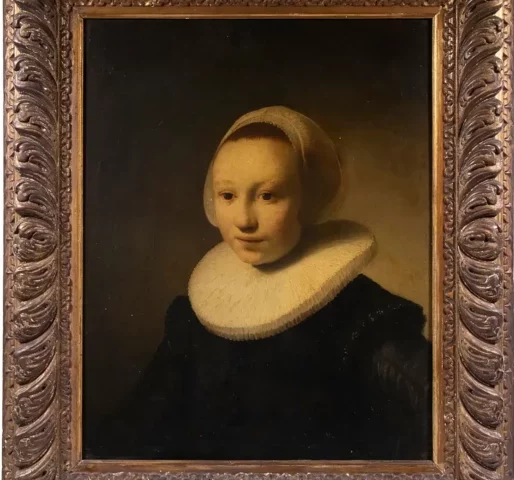
Brazilian music legend Sérgio Mendes dies at 83
8 Settembre 2024
Il Museo in Italia, tra «correttezza» e insipienza
8 Settembre 2024The attic, long a repository of discarded toys and the like, can sometimes turn up treasures.
Late last month, a painting that an auctioneer in Maine discovered and believed to be a work by the 17th-century Dutch painter Rembrandt van Rijn was sold at auction for $1.4 million. The artwork had apparently been stored in the attic of a farmhouse in Camden, Me., for decades.
Kaja Veilleux, the owner, appraiser and auctioneer of Thomaston Place Auction Galleries in Maine, said he found the painting, “Portrait of a Young Girl,” on a routine house call. It was among a stack of paintings that he came across while looking through the belongings of a wealthy family’s estate.
Mr. Veilleux said in a phone interview that he recognized Rembrandt’s style “right away.”
The painting, which shows the girl in a black dress with a white ruffled collar and a white cap, is in pristine condition, Mr. Veilleux said. The portrait was not signed, which is not entirely unusual: Rembrandt did not sign all of his paintings.
The portrait was painted on a cradled oak panel and mounted in a hand-carved gold Dutch frame, according to the auction house. A label on the back of the frame attributed the work to Rembrandt, and said that it had been displayed in a 1970 exhibition at the Philadelphia Museum of Art.
Maggie Fairs, a spokeswoman for the Philadelphia Museum of Art, said in an email that the museum had looked into it but that it was too hard to confirm if and when the painting had been on display at the museum because of the decades that had passed.
Nine people bid on the painting, which sold in August to an unknown European bidder for $1.4 million, making it the auction house’s most expensive painting ever sold. (The owners, as well as the buyer, remained anonymous.)
The painting could become more valuable if it is authenticated, said Mark Winter, an authentication expert who has been appraising art, including by Rembrandt, for more than two decades.
“The person who bought the painting for $1.4 million already got a great bargain,” Mr. Winter said in a phone interview. “The value of this painting is probably in the area of $15 million.”
Image

“It looks very strongly like a Rembrandt,” Mr. Winter said, adding that he thought that the girl in the portrait looked like other young women whom Rembrandt painted.
The number of known paintings by Rembrandt is relatively small. While he created more etchings and drawings, he only painted about 300 canvasses, according to The Mauritshuis, a museum in The Hague, which displays paintings from 17th-century artists.
One recent find of a previously unknown Rembrandt came in 2018, when Jan Six, a Dutch art dealer, said he had discovered that a 17th-century painting that had been attributed as “Netherlandish School” turned out to have been painted by Rembrandt.
In 2023, another painting by Rembrandt, “The Adoration of the Kings,” was sold at auction for almost $14 million, after experts determined it was in fact painted by the Dutch master. (Two years earlier, before the authentication, its value had been about $17,000.)
But it remains rare for a pristine 17th-century masterpiece to come out of a Maine attic. Mr. Winter, the authentication expert, said that his art authentication business received about two to three photos per week — and has done so for about two decades — from people asking him if they have a real Rembrandt on their hands.
But, he said, “we don’t discover new paintings by Rembrandt every day.”
For Mr. Veilleux, the auctioneer, coming eye to eye with a Rembrandt was a first in his more than five-decade career.
“We have had some pretty amazing discoveries throughout the years,” he said. “Doing this for so long I’ve pretty much seen everything,” he added, “except a Rembrandt.”
It’s unknown — and will probably remain unknown — how the painting made its way from the 17th-century Netherlands to a Maine attic in the 21st century.
“That’s part of the mystery,” Mr. Veilleux said. But, he added, “It’s a good thing we found it. Anyone else wouldn’t have known what to do with it.”






